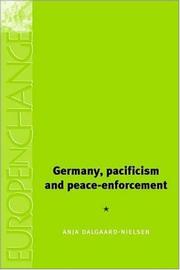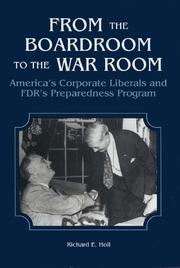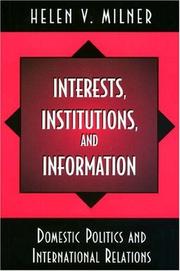| Listing 1 - 9 of 9 |
Sort by
|
Multi
ISBN: 9529616252 9789529616251 Year: 1993 Publisher: Åbo Åbo akademis förlag
Abstract | Keywords | Export | Availability | Bookmark
 Loading...
Loading...Choose an application
- Reference Manager
- EndNote
- RefWorks (Direct export to RefWorks)
Moral re-armament --- Finland. --- 261.64 --- -Buchmanism --- Moral rearmament --- MRA (Moral re-armament) --- Oxford Group movement --- Ethics --- Morele herbewapening --- Finland --- Church history. --- Theses --- -Morele herbewapening --- 261.64 Morele herbewapening --- -261.64 Morele herbewapening --- Buchmanism --- Moral re-armament - Finland.
Book
ISBN: 1805432532 Year: 2024 Publisher: Rochester : Boydell & Brewer, Incorporated,
Abstract | Keywords | Export | Availability | Bookmark
 Loading...
Loading...Choose an application
- Reference Manager
- EndNote
- RefWorks (Direct export to RefWorks)
A social history of West Germany's Bundesgrenzschutz (BGS, Federal Border Police) that complicates the telling of the country's history as a straightforward success story.
Border patrols --- Militarization of police --- HISTORY / Europe / Germany. --- Bundestag. --- Special Forces. --- Weimar Republic. --- World War II. --- army. --- civil service. --- civilian. --- combatants. --- communist. --- counterterrorism. --- discipline. --- ethics. --- law enforecement. --- masculinity. --- paramilitary. --- rearmament. --- recruitment. --- torture. --- History. --- Germany (West)

ISBN: 1781701385 184779212X 9781847792129 9781781701386 0719072689 9780719072680 9780719072680 0719072689 1847796419 9781847796417 Year: 2006 Publisher: Manchester Manchester University Press
Abstract | Keywords | Export | Availability | Bookmark
 Loading...
Loading...Choose an application
- Reference Manager
- EndNote
- RefWorks (Direct export to RefWorks)
Germany, pacifism and peace enforcement is about the transformation of Germany's security and defence policy in the time between the 1991 Gulf War and the 2003 war against Iraq. The book traces and explains the reaction of Europe's biggest and potentially most powerful country to the ethnic wars of the 1990's, the emergence of large-scale terrorism, and the new US emphasis on pre-emptive strikes. Based on an analysis of Germany's strategic culture it portrays Germany as a security actor and indicates the conditions and limits of the new German willingness to participate in international military
Security, International. --- National security --- Collective security --- International security --- International relations --- Disarmament --- International organization --- Peace --- Germany --- Military policy. --- Defenses. --- Rearmament --- German Bundestag. --- Germany. --- Iraq War. --- ethnic wars. --- international crises. --- large-scale terrorism. --- military crisis management. --- pre-emptive strikes. --- strategic culture. --- war in Afghanistan.
Book
ISBN: 128343976X 9786613439765 1400841860 9781400841868 9780691153407 069115340X 9781283439763 Year: 2012 Publisher: Princeton : Princeton University Press,
Abstract | Keywords | Export | Availability | Bookmark
 Loading...
Loading...Choose an application
- Reference Manager
- EndNote
- RefWorks (Direct export to RefWorks)
The history of Krupp is the history of modern Germany. No company symbolized the best and worst of that history more than the famous steel and arms maker. In this book, Harold James tells the story of the Krupp family and its industrial empire between the early nineteenth century and the present, and analyzes its transition from a family business to one owned by a nonprofit foundation. Krupp founded a small steel mill in 1811, which established the basis for one of the largest and most important companies in the world by the end of the century. Famously loyal to its highly paid workers, it rejected an exclusive focus on profit, but the company also played a central role in the armament of Nazi Germany and the firm's head was convicted as a war criminal at Nuremberg. Yet after the war Krupp managed to rebuild itself and become a symbol of Germany once again--this time open, economically successful, and socially responsible. Books on Krupp tend to either denounce it as a diabolical enterprise or celebrate its technical ingenuity. In contrast, James presents a balanced account, showing that the owners felt ambivalent about the company's military connection even while becoming more and more entangled in Germany's aggressive politics during the imperial era and the Third Reich. By placing the story of Krupp and its owners in a wide context, James also provides new insights into the political, social, and economic history of modern Germany.
Steel industry and trade --- History. --- Krupp family --- Fried. Krupp GmbH --- Friedrich Krupp GmbH --- Krupp (Firm) --- Krupp (Fried.) GmbH --- Krupp GmbH --- Fried. Krupp AG --- Alfred Krupp. --- Alfried Krupp. --- Bertha Krupp. --- Berthold Beitz. --- English steel. --- Friedrich Alfred Krupp. --- Friedrich Krupp. --- German Empire. --- German industrial culture. --- German industrial recovery. --- German steel industry. --- Germany. --- Gustav Krupp. --- Gustav von Bohlen. --- Helene Amalie Krupp. --- Kaiser Wilhelm II. --- Krupp company. --- Krupp directors. --- Krupp family. --- Krupp. --- Kruppianer. --- NIROSTA. --- Nazi Germany. --- Nazi policy. --- Nazism. --- Nuremberg trials. --- Therese Krupp. --- Third Reich. --- Wilhelmine Germany. --- Wilhelminism. --- World War I. --- World War II. --- armament. --- armaments. --- business development. --- business ethic. --- business expansion. --- business. --- corporate culture. --- demilitarization. --- diplomacy. --- economic depression. --- entrepreneur. --- entrepreneurship. --- family affairs. --- family business. --- financial crisis. --- financial incentives. --- globalization. --- interwar years. --- modern Germany. --- modernity. --- nationalist management. --- naval rearmament. --- political engagement. --- postwar Germany. --- profitability. --- rearmament. --- reinvention. --- social philosophy. --- steel industry. --- steel mill. --- steel production. --- war criminal. --- work ethics. --- History
Book
ISBN: 9780312293277 0312293275 0312293283 9786612765001 0230101887 1282765000 Year: 2009 Publisher: New York Palgrave Macmillan
Abstract | Keywords | Export | Availability | Bookmark
 Loading...
Loading...Choose an application
- Reference Manager
- EndNote
- RefWorks (Direct export to RefWorks)
Moral re-armament --- Moral rearmament --- Moral re-armament. --- Réarmement moral --- United States --- Etats-Unis --- Church history --- Histoire religieuse --- 27 <73> "19" --- 316:2 "19" --- Buchmanism --- MRA (Moral re-armament) --- Oxford Group movement --- Ethics --- Kerkgeschiedenis--Verenigde Staten van Amerika. VSA. USA--20e eeuw. Periode 1900-1999 --- Godsdienstsociologie--20e eeuw. Periode 1900-1999 --- -Moral re-armament. --- 316:2 "19" Godsdienstsociologie--20e eeuw. Periode 1900-1999 --- -Moral re-armament --- Réarmement moral --- 20th century

ISBN: 1580467016 1580461921 Year: 2005 Publisher: Suffolk : Boydell & Brewer,
Abstract | Keywords | Export | Availability | Bookmark
 Loading...
Loading...Choose an application
- Reference Manager
- EndNote
- RefWorks (Direct export to RefWorks)
Between World War I and World War II, America's corporate liberals experienced a profound ideological change. In the 1920s, corporate liberals embraced company-specific solutions to economic problems. They believed that if every company, in every industry, employed advanced managerial techniques -- such as granting workers non-wage benefits to increase their job satisfaction -- employment, production, and profits could be stabilized and prosperity sustained indefinitely. The Great Depression, of course, made a mockery of this idyllic vision. Corporate liberals admitted that private efforts failed to maintain the nation's economic health, ultimately endorsing large-scale government intervention to bail out the stricken economy. By 1935, the corporate liberal conversion from privatism to business-government partnership was well under way.
Corporate liberals served President Franklin Roosevelt throughout the Depression and preparedness periods. Marion Folsom of Eastman Kodak Corporation, Edward Stettinius, Jr. of United States Steel, and others joined New Deal agencies struggling to re-employ workers and bring about social security. Later, at Roosevelt's request, they entered emergency preparedness bodies to ready the United States for the possibility of war. When Japan attacked Pearl Harbor on December 7, 1941, the reconfigured American economy (which the corporate liberals had done so much to create) proved capable of mass producing weapons and other equipment. The bottom line, staunchly revisionist in nature, is that the corporate liberals ran an effective mobilization campaign, overcoming isolationist resistance to rearmament, Roosevelt's reluctance to grant them genuine authority, and other constraints.
Richard E. Holl is Professor of History at the Lees College Campus of Hazard Community and Technical College. His latest article, on Axis prisoners of war in Kentucky, won the Collins Award of the Kentucky Historical Society.
Corporate state --- Business and politics --- Industrial policy --- Business --- Politics and business --- Politics, Practical --- Political business cycles --- Corporations (Corporate state) --- Corporatism --- Corporative state --- Corporativism --- State, Corporate --- Political science --- Syndicalism --- Fascism --- Functional representation --- History --- Political aspects --- United States --- Economic policy --- Axis prisoners of war. --- Collins Award. --- Great Depression. --- Kentucky Historical Society. --- Kentucky. --- New Deal agencies. --- Richard E. Holl. --- World War I. --- World War II. --- corporate liberals. --- economic problems. --- emergency preparedness. --- employment. --- government intervention. --- managerial techniques. --- mobilization campaign. --- non-wage benefits. --- production. --- profits. --- rearmament. --- social security.
Book
ISBN: 1283457032 9786613457035 1400842492 9781400842490 9781283457033 9780691152028 9780691152035 0691152020 0691152039 6613457035 Year: 2012 Publisher: Princeton, NJ : Princeton University Press,
Abstract | Keywords | Export | Availability | Bookmark
 Loading...
Loading...Choose an application
- Reference Manager
- EndNote
- RefWorks (Direct export to RefWorks)
What makes for war or for a stable international system? Are there general principles that should govern foreign policy? In The Cold War and After, Marc Trachtenberg, a leading historian of international relations, explores how historical work can throw light on these questions. The essays in this book deal with specific problems--with such matters as nuclear strategy and U.S.-European relations. But Trachtenberg's main goal is to show how in practice a certain type of scholarly work can be done. He demonstrates how, in studying international politics, the conceptual and empirical sides of the analysis can be made to connect with each other, and �how historical, theoretical, and even policy issues can be tied together in an intellectually respectable way. These essays address a wide variety of topics, from theoretical and policy issues, such as the question of preventive war and the problem of international order, to more historical subjects--for example, American policy on Eastern Europe in 1945 and Franco-American relations during the Nixon-Pompidou period. But in each case the aim is to show how a theoretical perspective can be brought to bear on the analysis of historical issues, and how historical analysis can shed light on basic conceptual problems.
World politics --- Cold War. --- Colonialism --- Global politics --- International politics --- Political history --- Political science --- World history --- Eastern question --- Geopolitics --- International organization --- International relations --- Coexistence (World politics) --- Peaceful coexistence --- Philosophy. --- Polemology --- anno 1900-1999 --- American policy. --- Dean Acheson. --- Eastern Europe. --- France. --- Franco-American relations. --- George W. Bush. --- German rearmament. --- Henry Kissinger. --- John F. Kennedy. --- MC 48. --- NATO. --- Richard Nixon. --- Soviet Union. --- USSR. --- United States. --- Western Europe. --- anarchic system. --- anarchy. --- defense policy. --- foreign policy. --- foreign relations. --- international law. --- international order. --- international politics. --- international relations. --- nuclear sharing policy. --- nuclear strategy. --- nuclear weapons. --- political system. --- preemptive strategy. --- preventive war. --- state power. --- systemic forces. --- theoretical analysis. --- weapons of mass destruction.
Book
ISBN: 1781703248 1847794750 9781847794758 9781781703243 9780719067464 9780719067471 1847795951 Year: 2011 Publisher: Manchester Manchester University Press
Abstract | Keywords | Export | Availability | Bookmark
 Loading...
Loading...Choose an application
- Reference Manager
- EndNote
- RefWorks (Direct export to RefWorks)
This is the second book in a unique two-volume study tracing the evolution of the Labour Party's foreign policy throughout the 20th century to the present date.This is the first comprehensive study of the history of the Labour Party's worldview and foreign policy. It argues that Labour's foreign policy perspective should be seen not as the development of a socialist foreign policy, but as an application of the ideas of liberal internationalism.Volume Two provides a critical analysis of Labour's foreign policy since 1951. It examines Labour's attempts to rethink foreign policy, focusing on intr
Socialism --- History --- Labour Party (Great Britain) --- History. --- Great Britain --- Foreign relations --- Britanskai︠a︡ rabochai︠a︡ partīi︠a︡ --- British Labour Party --- Eikoku Rōdōtō --- Labor Party (Great Britain) --- Leĭboristskai︠a︡ partii︠a︡ Anglii --- Leĭboristskai︠a︡ partii︠a︡ Velikobritanii --- LPV --- Mifleget ha-laibor (Great Britain) --- Parti travailliste britannique --- Partido Laborista (Great Britain) --- Partido Laborista Británico --- Yŏngguk Nodongdang --- 工黨 (英國) --- Labour Representation Committee (Great Britain : 1900-1906) --- Labour Party. --- Suez crisis. --- Vietnam War. --- foreign policy. --- liberal internationalism. --- military force. --- nuclear disarmament. --- radicalisation. --- rearmament. --- war on terror.

ISBN: 069101177X 0691011761 0691214492 9780691011769 9780691011776 Year: 1997 Publisher: Princeton (N.J.) Princeton university press
Abstract | Keywords | Export | Availability | Bookmark
 Loading...
Loading...Choose an application
- Reference Manager
- EndNote
- RefWorks (Direct export to RefWorks)
Interests, Institutions, and Information examines the central factors that influence the strategic game of domestic politics. It shows that it is the outcome of this internal game - not fears of other countries' relative gains or the likelihood of cheating - that ultimately shapes how the international game is played out and therefore the extent of cooperative endeavors. The interaction of the domestic actors' preferences, given their political institutions and levels of information, defines when international cooperation is possible and what its terms will be. Several test cases examine how this argument explains the phases of a cooperative attempt: the initiation, the negotiations at the international level, and the eventual domestic ratification. The book reaches the surprising conclusion that theorists - neo-Institutionalists and Realists alike - have overestimated the likelihood of cooperation among states.
International relations. Foreign policy --- #SBIB:327.1H10 --- #SBIB:327.7H01 --- #SBIB:AANKOOP --- Internationale betrekkingen: theorieën --- Grondslagen, principes, evolutie internationale gemeenschap --- #A0206PO --- Information policy. --- International relations. --- Nation-state. --- World politics --- Information policy --- International relations --- Nation-state --- Information science --- Information services and state --- Communication policy --- National state --- State, The --- National interest --- Self-determination, National --- Coexistence --- Foreign affairs --- Foreign policy --- Foreign relations --- Global governance --- Interdependence of nations --- International affairs --- Peaceful coexistence --- World order --- National security --- Sovereignty --- Government policy --- INTERNATIONAL RELATIONS. --- CASE STUDIES. --- STATES. --- POLITICAL COOPERATION. --- International co-operation. --- Information. --- States. --- International politics. --- Foreign policy. --- Politics. --- Política interna. --- Política internacional. --- Relações internacionais. --- Rationele keuze. --- Politieke instellingen. --- Binnenlandse politiek. --- Internationale samenwerking. --- Theorie --- Nationalstaat --- Internationale Politik --- Interessenpolitik --- World politics. --- Accords internationaux. --- CED = Communaute europeenne de defense. --- Politique de l'information. --- Politique internationale. --- Relations internationales. --- UE/CE CECA. --- UE/CE Traite de Maastricht. --- Unions economiques et monetaires. --- 89.70 international relations: general. --- 89.71 international cooperation: general. --- Information --- Politique mondiale --- Nation. --- Politique gouvernementale. --- Colonialism --- Global politics --- International politics --- Political history --- Political science --- World history --- Eastern question --- Geopolitics --- International organization --- Belgium. --- Bundesbank. --- Chicago Convention. --- Democrats (US). --- Evans, Peter. --- Frieden, Jeffry. --- German rearmament. --- Jacobson, Harold. --- Keohane, Robert. --- Keynes Plan. --- Laver, Michael. --- Lijphart, Arendt. --- Milner, Helen. --- Obstfeld, Maurice. --- Phillips curve. --- Putnam, Robert. --- Rogowski, Ronald. --- Schelling conjecture. --- Truman Administration. --- absolute gains. --- amendment power. --- balance of payments. --- capital mobility. --- cartel. --- domestic politics. --- hierarchy. --- independents. --- interest groups. --- legislature. --- parliamentary systems. --- ratification. --- side payments. --- two-level games. --- World politics - 1989 --- -Information policy --- VIE INTERNATIONALE --- POLITIQUES PUBLIQUES --- REGLES INTERNATIONALES --- POLITIQUE ECONOMIQUE EXTERIEURE --- ORGANISATIONS INTERGOUVERNEMENTALES --- REGIMES INTERNATIONAUX --- Interessenvermittlung --- Lobbyismus --- Interessenverband --- Internationale Beziehungen --- Politische Beziehungen --- Zwischenstaatliche Beziehungen --- Weltpolitik --- Außenpolitik --- Internationales politisches System --- Nationalstaaten --- Staat --- Nationale Einheit --- Praxis
| Listing 1 - 9 of 9 |
Sort by
|

 Search
Search Feedback
Feedback About UniCat
About UniCat  Help
Help News
News